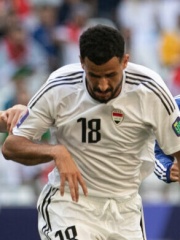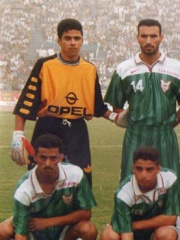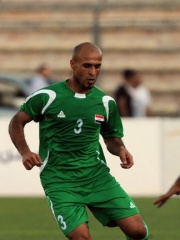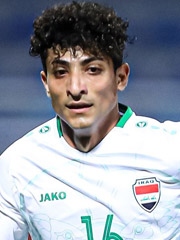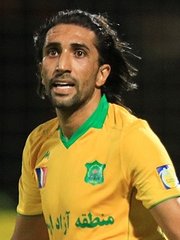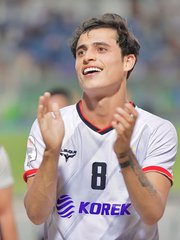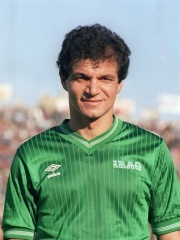

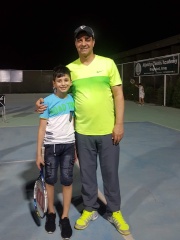
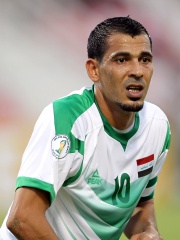



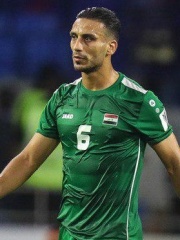
The Most Famous
SOCCER PLAYERS from Iraq
This page contains a list of the greatest Iraqi Soccer Players. The pantheon dataset contains 21,273 Soccer Players, 41 of which were born in Iraq. This makes Iraq the birth place of the 73rd most number of Soccer Players behind Albania, and Belarus.
Top 10
The following people are considered by Pantheon to be the top 10 most legendary Iraqi Soccer Players of all time. This list of famous Iraqi Soccer Players is sorted by HPI (Historical Popularity Index), a metric that aggregates information on a biography's online popularity. Visit the rankings page to view the entire list of Iraqi Soccer Players.

1. Hussein Saeed (b. 1958)
With an HPI of 55.92, Hussein Saeed is the most famous Iraqi Soccer Player. Her biography has been translated into 21 different languages on wikipedia.
Hussein Saeed Mohammed (Arabic: حُسَيْن سَعِيد مُحَمَّد, born 21 January 1958) is an Iraqi former footballer who played as a forward and is a former president of the Iraq Football Association. Saeed is in twelfth place in the list of top international goal scorers, with 78 goals. Along with Ahmed Radhi, he is considered to be the best Iraqi player of the 20th century and features in 25th place in Asia's Best Players of the Century list. Hussein's 78 international goals make him currently the Iraqi national team's highest scoring player. Saeed started his professional football career at the age of 17, when he joined the Iraq national varsity football team and won the 1975 Arab Schools Games gold medal. In 1975, he joined Al-Jamiea, who later became known as Al-Talaba, where he spent all 15 years of his career, achieving three league titles and getting the top goalscorer of the league award in three seasons. He won two AFC U-19 Championships, two Arabian Gulf Cups, where he was the top goalscorer of both occasions and the best player of one, a World Military Cup, and an Asian Games gold medal.

2. Raad Hammoudi (b. 1953)
With an HPI of 51.06, Raad Hammoudi is the 2nd most famous Iraqi Soccer Player. His biography has been translated into 17 different languages.
Raad Hammoudi Salman al-Aredhi (Arabic: رَعْد حَمُّودِيّ سَلْمَان الْعَارِضِيّ; born 1 May 1953) is a retired Iraqi football player who represented his country as a goalkeeper in the Olympics and the World Cup. He is known as the most successful goalkeeper in Iraqi football, leading Iraq to the 1986 FIFA World Cup. He made his international debut in 1976 against Turkey. Raad was an important part of the Al-Shorta side, captaining them to the Iraqi League in season 1979/80. He took three penalties for Al-Shorta, scoring two and missing one. He was goalkeeper of the tournament during Iraq's win in the 1979 Gulf Cup, when he conceded just one goal in six games, he was also in goal when Iraq won the Asian Games in 1982. Raad started his career in 1972 when he joined second division club Kuliya Al-Shurta (where he won the Iraqi Central Second Division), a team which along with Shurta Al-Najda and Aliyat Al-Shorta were replaced in the top-flight by Al-Shurta Sports Club. Raad played in the 1984 Olympics and 1986 World Cup in Mexico, where he played in the two games against Paraguay and Belgium. In 1999, Raad was placed by the German-based Federation of Football History & Statistics (IFFHS) as Iraq's 4th best player of the century behind the likes of Ahmed Radhi, Hussein Saeed and Habib Jafar. He was the head of the National Olympic Committee of Iraq during 2009-2024.

3. Ahmed Radhi (1964 - 2020)
With an HPI of 50.75, Ahmed Radhi is the 3rd most famous Iraqi Soccer Player. His biography has been translated into 26 different languages.
Ahmed Radhi Humaiesh Al-Salehi (Arabic: أَحْمَد رَاضِي هَمِيش الصَّالِحِيّ, 21 April 1964 – 21 June 2020) was an Iraqi footballer who played as a striker. Nicknamed "Al-Saher" (The Magician) in his playing days and regarded as one of Iraq's and Asia's best players of all time, Radhi scored the only Iraqi goal at the FIFA World Cup in its 1986 edition, a low shot to the corner of the net against Belgium in a 2–1 defeat. He was voted the Asian Footballer of the Year in 1988.

4. Younis Mahmoud (b. 1983)
With an HPI of 48.76, Younis Mahmoud is the 4th most famous Iraqi Soccer Player. His biography has been translated into 30 different languages.
Younis Mahmoud Khalaf (Arabic: يُونُس مَحْمُود خَلَف; born 3 February 1983) is an Iraqi former professional footballer who played as a forward for the Iraq national team and is currently the second vice-president of the Iraq Football Association. One of the country's greatest ever players, Mahmoud captained the team for ten consecutive years and became an icon of Asian football. He also played for a number of clubs in the Iraqi Premier League, the UAE Arabian Gulf League, the Qatar Stars League and the Saudi Professional League, winning three Golden Boots in Qatar and breaking numerous records. Mahmoud's first official international goal was an equaliser in the 89th minute of the final of the 2002 WAFF Championship, which Iraq then went on to win in extra-time. Three years later, Mahmoud scored in the final of the 2005 West Asian Games to lead his team to another title, before becoming the national team captain a year later. In 2007, Mahmoud achieved the best honour of his career, leading his country to win the 2007 AFC Asian Cup, their first such success, scoring the winning goal in the final and also winning the Golden Boot and Most Valuable Player awards at the tournament. In the 2007 Ballon d'Or, Mahmoud finished in 29th place, becoming the only Iraqi player ever to be nominated for the Ballon d'Or. Mahmoud played in all three of Iraq's 2009 FIFA Confederations Cup matches and scored in the final of the Arabian Gulf Cup in 2013, before retiring in 2016 as the most-capped player in Iraq's history and their third-highest goalscorer ever. He is also the only player in history to score in four different (and consecutive) AFC Asian Cup tournaments, with one goal in 2004, four in 2007, one in 2011 and two in 2015.

5. Hawar Mulla Mohammed (b. 1981)
With an HPI of 48.22, Hawar Mulla Mohammed is the 5th most famous Iraqi Soccer Player. His biography has been translated into 26 different languages.
Hawar Mulla Mohammed Taher Zebari (Kurdish: هەوار مەلا محەمەد تاهر زێبارى; Arabic: هوار ملا محمد طاهر زيباري; born 1 June 1981) is an Iraqi former professional footballer. He played as a winger or wingback for Al-Quwa Al-Jawiya, Al-Ansar, Apollon Limassol, Al Khor, Anorthosis, Persepolis, Esteghlal, Zob Ahan, and Erbil before retiring on 11 June 2015.

6. Samir Shaker (b. 1958)
With an HPI of 47.33, Samir Shaker is the 6th most famous Iraqi Soccer Player. His biography has been translated into 15 different languages.
Samir Shaker Mahmoud (Arabic: سَمِير شَاكِر مَحْمُود; born 28 February 1958) is an Iraqi former professional footballer who played as defender. He played for the Iraq national team in the 1986 FIFA World Cup. He also played for Al-Rasheed Club.

7. Nadhim Shaker (1958 - 2020)
With an HPI of 46.43, Nadhim Shaker is the 7th most famous Iraqi Soccer Player. His biography has been translated into 17 different languages.
Nadhim Shaker Salim (Arabic: ناظم شاكر سالم; 18 December 1958 – 11 September 2020) was an Iraqi football player and coach of the Iraq national team.

8. Ali Hussein Shihab (1961 - 2016)
With an HPI of 46.21, Ali Hussein Shihab is the 8th most famous Iraqi Soccer Player. His biography has been translated into 15 different languages.
Ali Hussein Shihab (Arabic:علي حسين شهاب ; May 5, 1961 – October26, 2016) was an Iraqi football midfielder who played for Iraq in the 1986 FIFA World Cup. He also played for Al-Talaba. Ali Hussein was an industrious player who was a regular in the midfield in the Iraqi national team during the 1980s, alongside one-time Talaba teammates Haris Mohammed, Natiq Hashim and Basil Gorgis. Ali was part of a Talaba team that included Iraqi internationals Jamal Ali and Hussein Saeed which won three league titles during the 80s. He played in all three games in the 1986 World Cup lining up against Paraguay, Belgium and hosts Mexico. Ali was also part of the team that won the 1982 Asian Games in India, which included Raad Hammoudi, Falah Hassan and Hussein Saeed. Ali died on 26 October 2016 of a terminal illness.

9. Ali Adnan Kadhim (b. 1993)
With an HPI of 45.67, Ali Adnan Kadhim is the 9th most famous Iraqi Soccer Player. His biography has been translated into 29 different languages.
Ali Adnan Kadhim Nasser Al-Tameemi (Arabic: عَلِيّ عَدْنَان كَاظِم نَاصِر التَّمِيمِيّ; born 19 December 1993) is an Iraqi professional footballer who plays as a left-back for Saudi First Division League club Al Wehda and the Iraq national team. Adnan has played at the 2013 FIFA U-20 World Cup, where he was one of Iraq's star players as the underdogs went on to reach the semi-final. He won the 2013 Asian Young Footballer of the Year.

10. Basil Gorgis (b. 1961)
With an HPI of 45.07, Basil Gorgis is the 10th most famous Iraqi Soccer Player. His biography has been translated into 15 different languages.
Basil Gewargis Hanna or Basil Korkis (Arabic: باسل كوركيس) (born 8 January 1961) is a former Iraqi international football player of Assyrian descent. Despite having a short career, he is considered to be one of the best players of all time in Iraq, being known for his tenacity and attacking threat. As a player, Basil took the national team to uncharted territory, where he was part of the Iraqi "golden team" of the 1980s that included Hussein Saeed and Ahmad Radhi. Basil is married and they have three daughters together.
People
Pantheon has 41 people classified as Iraqi soccer players born between 1953 and 2004. Of these 41, 37 (90.24%) of them are still alive today. The most famous living Iraqi soccer players include Hussein Saeed, Raad Hammoudi, and Younis Mahmoud. The most famous deceased Iraqi soccer players include Ahmed Radhi, Nadhim Shaker, and Ali Hussein Shihab. As of April 2024, 10 new Iraqi soccer players have been added to Pantheon including Emad Mohammed, Haidar Abdul-Razzaq, and Ali Jasim.
Living Iraqi Soccer Players
Go to all RankingsHussein Saeed
1958 - Present
HPI: 55.92
Raad Hammoudi
1953 - Present
HPI: 51.06
Younis Mahmoud
1983 - Present
HPI: 48.76
Hawar Mulla Mohammed
1981 - Present
HPI: 48.22
Samir Shaker
1958 - Present
HPI: 47.33
Ali Adnan Kadhim
1993 - Present
HPI: 45.67
Basil Gorgis
1961 - Present
HPI: 45.07
Aymen Hussein
1996 - Present
HPI: 43.35
Nashat Akram
1984 - Present
HPI: 43.22
Noor Sabri
1984 - Present
HPI: 42.43
Bassim Abbas
1982 - Present
HPI: 41.89
Emad Mohammed
1982 - Present
HPI: 40.50
Deceased Iraqi Soccer Players
Go to all RankingsAhmed Radhi
1964 - 2020
HPI: 50.75
Nadhim Shaker
1958 - 2020
HPI: 46.43
Ali Hussein Shihab
1961 - 2016
HPI: 46.21
Haidar Abdul-Razzaq
1982 - 2022
HPI: 39.70
Newly Added Iraqi Soccer Players (2025)
Go to all RankingsEmad Mohammed
1982 - Present
HPI: 40.50
Haidar Abdul-Razzaq
1982 - 2022
HPI: 39.70
Ali Jasim
2004 - Present
HPI: 37.20
Mahdi Karim
1983 - Present
HPI: 36.52
Karrar Jassim
1987 - Present
HPI: 35.73
Rebin Sulaka
1992 - Present
HPI: 35.65
Ameen Al-Dakhil
2002 - Present
HPI: 35.10
Ibrahim Bayesh
2000 - Present
HPI: 33.92
Sherko Karim
1996 - Present
HPI: 31.80
Mahdi Kamil
1995 - Present
HPI: 31.68
Overlapping Lives
Which Soccer Players were alive at the same time? This visualization shows the lifespans of the 4 most globally memorable Soccer Players since 1700.

